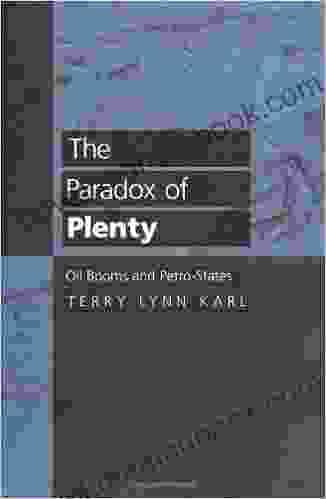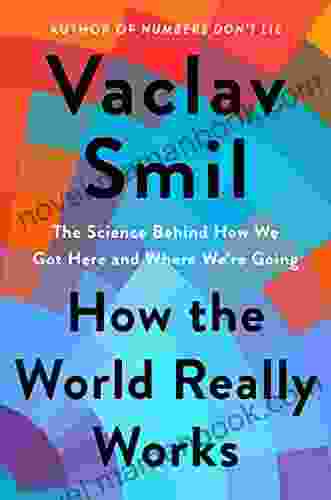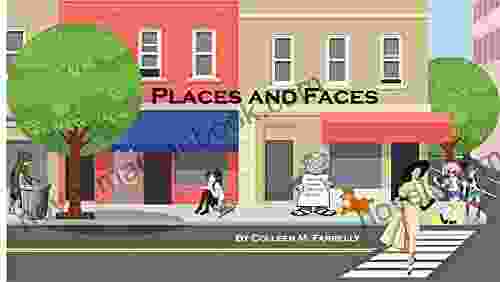The Paradox of Plenty: Abundance, Scarcity, and the Human Condition

In an era characterized by unprecedented material abundance, the Paradox of Plenty poses a profound challenge to our understanding of human nature and well-being. This phenomenon suggests that the very abundance of choices and possibilities that modern society offers can paradoxically lead to a sense of scarcity, discontentment, and emptiness.
4.7 out of 5
| Language | : | English |
| File size | : | 3962 KB |
| Text-to-Speech | : | Enabled |
| Print length | : | 380 pages |
| Lending | : | Enabled |
| Screen Reader | : | Supported |
Psychological Roots
At the heart of the Paradox of Plenty lies the psychological phenomenon known as "choice overload." When faced with an overwhelming array of options, individuals often experience a sense of paralysis and anxiety. Instead of empowering us, excessive choice can trigger cognitive overload, making it difficult to evaluate and select the best course of action.
This decision-making paralysis can lead to a sense of missed opportunities and regret. As we navigate the endless aisles of consumer goods or scroll through countless streaming services, we are constantly confronted with the fear of making the wrong choice and missing out on a better option.
Social and Cultural Factors
The Paradox of Plenty is not solely a psychological phenomenon; it also has deep social and cultural roots. In many modern societies, materialism has become a dominant cultural value. We are constantly bombarded with messages that equate happiness and success with material possessions and experiences.
This relentless pursuit of material abundance can create a sense of constant striving and never-ending dissatisfaction. No matter how much we accumulate, there is always something more to desire, something better to buy. The Paradox of Plenty traps us in a perpetual cycle of consumption, where we chase the elusive illusion of fulfillment.
Evolutionary Origins
The Paradox of Plenty may also have evolutionary roots. As humans evolved in environments where resources were scarce, our brains developed a strong bias towards seeking and acquiring resources. This instinctual drive served us well in our ancestral past, but it may not be as well-suited to the conditions of modern abundance.
In an environment where resources are unlimited, our scarcity mindset can lead to hoarding, overconsumption, and a constant sense of anxiety about future shortages. This evolutionary legacy may contribute to the psychological and social challenges posed by the Paradox of Plenty.
Consequences for Well-Being
The Paradox of Plenty has profound implications for our well-being. Studies have shown that excessive choice can lead to lower levels of satisfaction, increased anxiety, and diminished psychological well-being. The constant pressure to make choices and the fear of missing out can take a toll on our mental health.
Furthermore, the Paradox of Plenty can contribute to a sense of disconnection and isolation. When we are constantly focused on acquiring material goods and achieving external validation, we may neglect our relationships and our deeper values. This can lead to a feeling of emptiness and a loss of meaning in life.
Societal Implications
The Paradox of Plenty also raises important societal questions. In an age where abundance is available to some but not to others, it is crucial to address the issue of inequality and social justice. How can we ensure that everyone has access to the resources and opportunities they need to thrive?
Moreover, the Paradox of Plenty challenges us to rethink our relationship with consumption and materialism. Do we truly need all the things we buy? What are the environmental and social costs of our excessive consumption? These are complex questions that require thoughtful consideration and collective action.
Overcoming the Paradox
Overcoming the Paradox of Plenty requires a multifaceted approach that addresses both its psychological, social, and evolutionary roots. Here are some strategies to consider:
- Embrace selective consumption: Focus on choosing high-quality items that align with your values and needs rather than buying indiscriminately.
- Practice mindfulness: Pay attention to your thoughts and feelings when making choices. Notice when you are driven by fear of missing out or a desire for external validation.
- Engage in non-material activities: Make time for activities that bring you joy and fulfillment, such as spending time in nature, pursuing hobbies, or connecting with loved ones.
- Cultivate gratitude: Express appreciation for what you already have and recognize the abundance in your life, both material and non-material.
- Challenge societal norms: Question the messages that equate happiness with consumption and seek out alternative values that emphasize well-being, community, and sustainability.
The Paradox of Plenty is a complex phenomenon that challenges our assumptions about abundance and well-being. By understanding its psychological, social, and evolutionary roots, we can begin to develop strategies to overcome its challenges.
Embracing selective consumption, practicing mindfulness, engaging in non-material activities, cultivating gratitude, and challenging societal norms are all steps we can take to break free from the cycle of scarcity and dissatisfaction.
Overcoming the Paradox of Plenty requires a conscious effort and a willingness to re-examine our values and priorities. By ng so, we can create a more fulfilling and sustainable future for ourselves and for generations to come.
4.7 out of 5
| Language | : | English |
| File size | : | 3962 KB |
| Text-to-Speech | : | Enabled |
| Print length | : | 380 pages |
| Lending | : | Enabled |
| Screen Reader | : | Supported |
Do you want to contribute by writing guest posts on this blog?
Please contact us and send us a resume of previous articles that you have written.
 Top Book
Top Book Novel
Novel Fiction
Fiction Nonfiction
Nonfiction Literature
Literature Paperback
Paperback Hardcover
Hardcover E-book
E-book Audiobook
Audiobook Bestseller
Bestseller Classic
Classic Mystery
Mystery Thriller
Thriller Romance
Romance Fantasy
Fantasy Science Fiction
Science Fiction Biography
Biography Memoir
Memoir Autobiography
Autobiography Poetry
Poetry Drama
Drama Historical Fiction
Historical Fiction Self-help
Self-help Young Adult
Young Adult Childrens Books
Childrens Books Graphic Novel
Graphic Novel Anthology
Anthology Series
Series Encyclopedia
Encyclopedia Reference
Reference Guidebook
Guidebook Textbook
Textbook Workbook
Workbook Journal
Journal Diary
Diary Manuscript
Manuscript Folio
Folio Pulp Fiction
Pulp Fiction Short Stories
Short Stories Fairy Tales
Fairy Tales Fables
Fables Mythology
Mythology Philosophy
Philosophy Religion
Religion Spirituality
Spirituality Essays
Essays Critique
Critique Commentary
Commentary Glossary
Glossary Bibliography
Bibliography Index
Index Table of Contents
Table of Contents Preface
Preface Introduction
Introduction Foreword
Foreword Afterword
Afterword Appendices
Appendices Annotations
Annotations Footnotes
Footnotes Epilogue
Epilogue Prologue
Prologue Hilda Ochoa Brillembourg
Hilda Ochoa Brillembourg Henry Louis Gates Jr
Henry Louis Gates Jr Matt Medlock
Matt Medlock Jackie Kay
Jackie Kay Sl Huang
Sl Huang Chef Maggie Chow
Chef Maggie Chow Charlie Laderman
Charlie Laderman Collins Gcse
Collins Gcse Rue Sparks
Rue Sparks Warren Elsmore
Warren Elsmore Steve Harvey
Steve Harvey Clark Graham
Clark Graham Pat Conroy
Pat Conroy John Freeman
John Freeman Scott Straughan
Scott Straughan Paul Ogier
Paul Ogier Samuel Marquis
Samuel Marquis Harriet De Winton
Harriet De Winton Kristy Cambron
Kristy Cambron K T Coolbricks
K T Coolbricks
Light bulbAdvertise smarter! Our strategic ad space ensures maximum exposure. Reserve your spot today!
 Mario SimmonsFollow ·19.6k
Mario SimmonsFollow ·19.6k Osamu DazaiFollow ·8.3k
Osamu DazaiFollow ·8.3k Jeremy CookFollow ·18.1k
Jeremy CookFollow ·18.1k Lord ByronFollow ·17.7k
Lord ByronFollow ·17.7k Alexandre DumasFollow ·17k
Alexandre DumasFollow ·17k Thomas HardyFollow ·11.3k
Thomas HardyFollow ·11.3k Jeff FosterFollow ·16.3k
Jeff FosterFollow ·16.3k Lawrence BellFollow ·13.2k
Lawrence BellFollow ·13.2k

 Preston Simmons
Preston SimmonsThe Ultimate Manual for Men: A Guide to Living a...
Being a man in today's world can be...
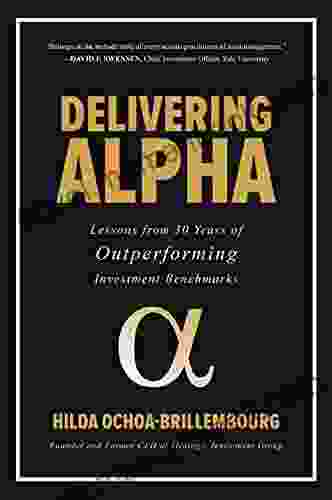
 José Martí
José MartíLessons From 30 Years of Outperforming Investment...
The stock market is a complex and...
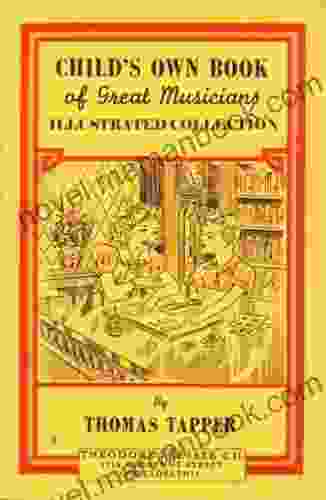
 Leo Mitchell
Leo MitchellChildren of Great Musicians: An Illustrated Collection
Music has the power to move us,...

 Jackson Hayes
Jackson HayesGet Room Quirky Lustful Poetry
Poetry is a form of...

 Rex Hayes
Rex HayesComprehensive Guide For Advisers Practitioners And...
The Heilbrunn Center is a mental health...
4.7 out of 5
| Language | : | English |
| File size | : | 3962 KB |
| Text-to-Speech | : | Enabled |
| Print length | : | 380 pages |
| Lending | : | Enabled |
| Screen Reader | : | Supported |


